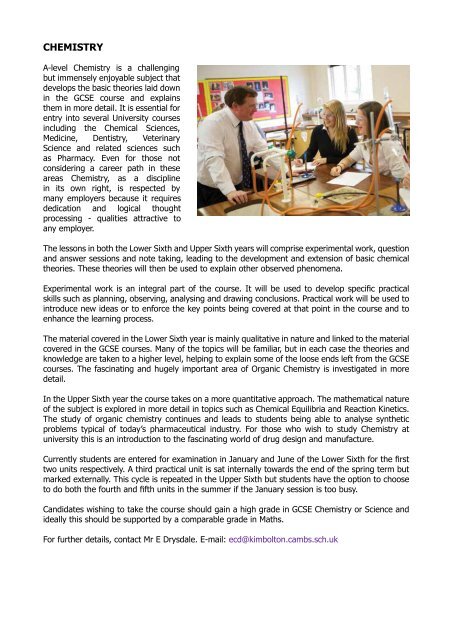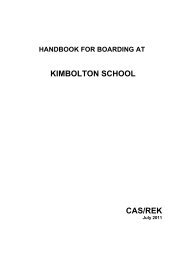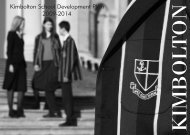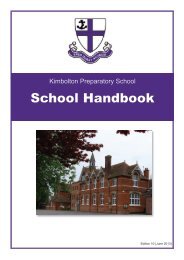Sixth Form Prospectus - Kimbolton School
Sixth Form Prospectus - Kimbolton School
Sixth Form Prospectus - Kimbolton School
- No tags were found...
Create successful ePaper yourself
Turn your PDF publications into a flip-book with our unique Google optimized e-Paper software.
CHEMISTRYA-level Chemistry is a challengingbut immensely enjoyable subject thatdevelops the basic theories laid downin the GCSE course and explainsthem in more detail. It is essential forentry into several University coursesincluding the Chemical Sciences,Medicine, Dentistry, VeterinaryScience and related sciences suchas Pharmacy. Even for those notconsidering a career path in theseareas Chemistry, as a disciplinein its own right, is respected bymany employers because it requiresdedication and logical thoughtprocessing - qualities attractive toany employer.The lessons in both the Lower <strong>Sixth</strong> and Upper <strong>Sixth</strong> years will comprise experimental work, questionand answer sessions and note taking, leading to the development and extension of basic chemicaltheories. These theories will then be used to explain other observed phenomena.Experimental work is an integral part of the course. It will be used to develop specific practicalskills such as planning, observing, analysing and drawing conclusions. Practical work will be used tointroduce new ideas or to enforce the key points being covered at that point in the course and toenhance the learning process.The material covered in the Lower <strong>Sixth</strong> year is mainly qualitative in nature and linked to the materialcovered in the GCSE courses. Many of the topics will be familiar, but in each case the theories andknowledge are taken to a higher level, helping to explain some of the loose ends left from the GCSEcourses. The fascinating and hugely important area of Organic Chemistry is investigated in moredetail.In the Upper <strong>Sixth</strong> year the course takes on a more quantitative approach. The mathematical natureof the subject is explored in more detail in topics such as Chemical Equilibria and Reaction Kinetics.The study of organic chemistry continues and leads to students being able to analyse syntheticproblems typical of today’s pharmaceutical industry. For those who wish to study Chemistry atuniversity this is an introduction to the fascinating world of drug design and manufacture.Currently students are entered for examination in January and June of the Lower <strong>Sixth</strong> for the firsttwo units respectively. A third practical unit is sat internally towards the end of the spring term butmarked externally. This cycle is repeated in the Upper <strong>Sixth</strong> but students have the option to chooseto do both the fourth and fifth units in the summer if the January session is too busy.Candidates wishing to take the course should gain a high grade in GCSE Chemistry or Science andideally this should be supported by a comparable grade in Maths.For further details, contact Mr E Drysdale. E-mail: ecd@kimbolton.cambs.sch.uk








